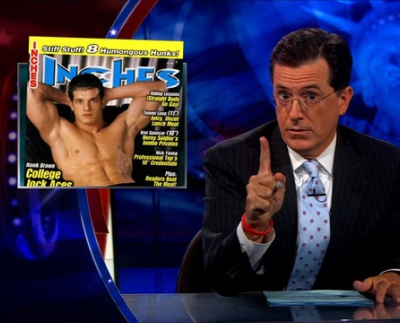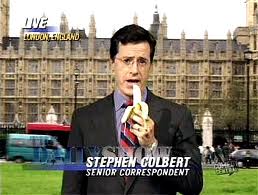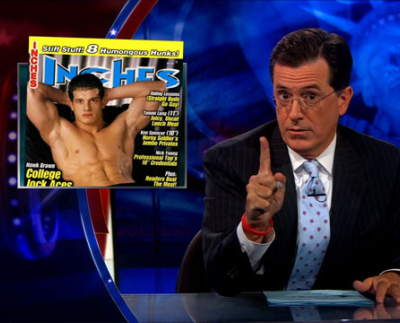
Stephen Colbert, a visionary Gen-X comedian who is especially popular with Millennials
(unedited, rough draft) © 2011 Jonathan Zap
An interesting trend I’ve noticed on Facebook is that young guys, who are mostly known to be heterosexual, and who usually have higher-than-average social status, make graphic statements about loving gay sex as jokes. For example, a probably heterosexual twenty-one-year-old student at CU posted a Facebook status update: “I love the way cock feels in and around my mouth.” Friends left good-natured comments going with the joke. In another such status update I noticed this morning, a very high status nineteen-year-old-male who is known to be popular with girls, has a bit of a reputation as a street fighter, and works in heavy construction posted: “now that i let some dude finish in my mouth i want in the butt.” Friends then posted comments that seemed to share in the joke, but without being mean-spirited, e.g. “ha, ha, I’m stoked.” They were all laughing with, not at, the joker.
As a student of popular culture who writes about the evolution of sexuality (see http://zaporacle.com/eros-love-and-sexuality/ for some of my essays on the subject), I find this extremely interesting. But I also recognize that I’m a middle-aged guy, and could easily miss nuances of youth culture, so please fill me in if I’m misunderstanding this phenomenon. As far as I can tell it is actually a subtle and paradoxical mutation of a kind of a loosely interpreted machismo but with some very positive evolutionary significance. Essentially, it is a display of social confidence, and usually of confidence in the joker’s heterosexual status, as well as a display of anti-homophobia. In most cases it seems to say: I’m so confident in my heterosexual status that I can make this kind of joke without worrying that anyone will misunderstand my intention or turn it against me. The very positive aspect is that the joking assumes, quite accurately, a social network that both understands irony and that is anti-homophobic. The young males I’ve noticed engaging this sort of humor are usually well above-average in both looks and popularity with girls and are known to be heterosexual. A few have a bit of androgynous, meterosexual coolness about them, but others look no different than mainstream American high school or college students. The positive aspect, and this part is quite positive, is that we seem to have evolved so suddenly from homophobia as a norm to where this ironic form of homoeroticism is a badge of coolness.
If one wanted to look for a shadow side to this positive change, I suppose in some cases it could be perceived as subtly cruel and intimidating to some gay youth. Even so, subtle intimidation is preferable to the overt bullying and queer-bashing that still continues alongside the countervailing trends of increased acceptance, etc. At the more mysterious edges of the phenomenon is the Freudian theory that humor almost always revolves around objects of anxiety. An increase of political oppression, in many cultures at least, leads to an increase in political jokes. The cultural delusion is that we’re all sophisticated about sexuality now, and that our joking about it is a product of our sophisticated knowingness. Actually, jokes about sex, which are more often tiresome and stereotyped than original, seem to reflect a continuing and widespread anxiety about sexuality. As one writer put it (I’m paraphrasing from memory), we know about as much about sexuality as stone age man knew about fire. We know that if we rub two things together that it will produce heat, but we often don’t know much more than that. Most are so sure that they are sophisticated about sex that they don’t bother to looking into the vast unexplored continents of what we don’t know about it.
In the present case, we should be careful not to apply Freud’s humor-as-a-function-of-anxiety theory too simplistically. The simplistic way to apply it would be to assume that such humor was anti-homophobic homoeroticism as a Trojan Horse for continuing anxious homophobia. Since Freud and most psychologists assume bisexuality as the norm, heterosexuals joking about homoeroticism would be interpreted as displacing anxiety about the repressed side of their sexuality. Although I’m sure that a degree of this must be true in some cases, I think applying the theory to this case would be formulaic and would miss some key differences. Some of the male jokers would claim, and probably quite authentically, that if they discovered themselves to have such leanings that they wouldn’t hesitate to act on them.
In one case I know very well, one of the male jokers is a nineteen-year-old masculine bisexual with a transexual girlfriend. They are very open about their relationship and they live in a non-Austin, not-very-gay-friendly part of Texas. They are both willing, able, and have an actual history, of physically fighting red necks who want to give them shit over their sexual orientation (as well as their public atheism/anarchism, etc.). The jokes the permanently male part of the couple would often make as status updates were still jokes and not literal, graphic descriptions, and had much of the same flavor as the heterosexual guys his age making homoerotic jokes.
Presently, I’m inclined to see this sort of joking as serving a positive, collective function rather than as a function of individual anxiety about sexuality. Yes, on the shadow side, there is a certain status display aspect to it, but then, there’s a status display aspect to so much of human communication that I don’t think this is the salient ingredient. I also feel that the flavor of this sort of joking is distinctly different than the endless homoerotic/homophobic joking of some all-male groups—for example, the coach or drill sergeant calling players/recruits “ladies” and so forth. I’m not saying that the boundary between these two flavors (the traditional barracks/locker room sort vs. the new social networking sort) of joking is absolutely distinct, in some cases it may be indistinct, but in most cases I have a hunch that it does represent something new. The older form seems nervously and compulsively stereotypical and the newer forms seems more self-aware and exuberantly confident. The older form certainly does seem like a function of anxiety about homosexuality, etc. exactly as the Freudian model would suggest. I don’t think that’s the primary source of the newer form of joking, however. One clear distinction dramatically separates the two forms— the older type of joking is practiced by overtly homophobic guys, while the newer form is practiced by guys who are overtly anti-homophobic.
Presently I’m inclined to see this type of joking as serving a positive collective function of depotentiating homophobia through humor. Something else I’ve noticed is that it seems to be an exclusively guy thing. I haven’t noticed the equivalent thing among young women—i.e. heterosexual young women joking about hot lesbian sex in graphic language, etc. No doubt there are examples somewhere, but it seems dramatically less prevalent. It also seems to be, as far as I can tell, a Millennium Generation thing.


Gen-Xer comedians Steven Colbert and John Stewart do it, but they are visionary geniuses tuned into youth culture and are outliers in general. In their case, the humor is clearly positive in its ironic anti-homophobia pose.
Anyway, this is just a first take at understanding this and I’d be grateful for any comments or samples anyone can offer that may help illuminate this interesting development. Please send to [email protected]
So far, three millennial guys have weighed in, and it looks like I did misconstrue some things, though there does seem to be agreement so far that there has been a subtle and significant change in the nature of this sort of humor. When I first saw one of the updates my first impression was that the person had been pranked by someone else who had gained control of their Facebook. It looks like I should have taken that impression more seriously and that does explain some, but not all of the occurrences. A twenty-one year old university student we’ll call Jason, whose status update I quoted above, wrote:
“You did kind of miss the point of the jokes. Usually those status updates on facebook are not actually written by the person themselves. Someone will go onto another person’s computer and change their status to something embarrassing as a joke. So there is still some homophobia in it. I do think that the type of joking you are talking about is becoming more common though, just outside of facebook. Its not uncommon to see two straight friends joking about how sexy the other is, playfully stroke the other’s face, or just generally go out of their way to act as if they are extremely gay. As far as what I think about this type joking, I would guess that it probably does make gay people uncomfortable at times, as homosexuality is still the root of the joke. But I would agree with you that it does also target homophobia, and makes that position seem silly. So I would probably agree with your assessment that overall the jokes push people towards a less homophobic position.”
Another Millennial, a twenty-two year old university student we’ll call Jeremy, wrote:
Just finished a cursory reading of your new article. It’s a fascinating subject to look into. It seems to be a very positive indicator that we are living in increasingly progressive times and moving towards greater tolerance and acceptance… It is rather funny for heterosexual boys to be relating to each other in such homoerotic ways. I think one side of it that you didn’t articulate in your article is that it is a hearty expression of love and affection that tight knit groups of boys have for one another, but being heterosexual and young are at a loss as to how to express that love and affection. That type of joking is done in such a jocular and exaggerated way, that the underlying expression of affection becomes more funny, endearing and acceptable. When I was in high school, my group of friends would joke in that way with one another and it was that sense of love and companionship in a non sexual way that energized the spirit behind those jokes.
But I disagree with you in your theory that it is a display of status. I think certain personalities are attracted to that kind of quirky humor irrespective of their status. For instance when I was living in the dorms in (name of college removed), I fell in with a group of kids, who were sort of like the cool party boys. Some of them would joke in that way, but the guy who was the biggest ladies man and was the tallest and generally had the reputation as being the coolest, did not joke around in that way. He wasn’t against it, but he just personally didn’t do it. Likewise, even though ______ always was more of a high status cool kid he never really took to that type of humor either. Another kid comes to mind in that high school group of friends who had some status, and would joke around like that probably more than anyone else in that group, but who was also extremely insecure.
If there is a shadow side, I think more than anything it is that when that type of joking is socially acceptable it becomes easier to actually use it in a hostile or insulting way, under the guise of benign joking. Like someone saying about someone else they did not particularly care for “he wants to take it up the butt.” Whereas if the statement was overtly homophobic or bigoted or spoken by someone with a history of bigotry, it would not be socially tolerated, now it is tolerated because it has been said by someone who sometimes jokes around in that gay friendly way. Some of my friends would do that kind of thing sometimes. But it is very bigoted, maybe even unconsciously bigoted, and is also very mean spirited and toxic.
It is also pretty common for groups of girls to joke around in that homoerotic way. It was not uncommon for girls in high school to joke around about having topless pillow fights and that sort of thing. It was also not uncommon at all at parties for two heterosexual girls who were close friends to actually make out with each other. But with girls joking in that way, and also actually kissing each other had elements of narcissism in it that the boy humor does not have.
There also may be something to the theory that some, if not many of the guys joking around like that actually have secret or unconscious attractions to other men.
Among many great insights offered by Jason and Jeremy, they reminded me that now and in the past, awkwardness in expressing actual feelings—affection, solidarity, love, attraction, etc.—is often covered by humor. Anxiety about appearing gay, or too emotional, may be covered by comedically exaggerating the homoerotic as a cloak. In some cases there may be a cloaked sexual element, in others it may be other feelings that are felt to be too awkward to express plainly. Humor is often used as a shape-shifting disguise. If simple, declarative statements collapse the wave function of meaning into a definite form, humor allows for high degrees of ambiguity which can be ideal for the expression of ambiguous eros and ambivalent emotions. In some cases, the joker may even be clear about what their disguised feelings are, but he may prefer, for his sake and/or the sake of others, to cloak the expression of feelings with humor so as to seem to uphold social norms. In other cases a mask of ambiguous humor covers inner ambiguity and confusion about eros.
A twenty-year-old openly gay male we’ll call Adrian made the following comment:
Loved the article. Very interesting. It is funny, because I noticed a lot of homoerotic joking as well at (name deleted alternative high school), between a group of about 7 or so guys at ________, touching each other in sexual places, whistling, talking in gay-esk voices, and even joking around with me every now and then. For just a couple of them, I did feel that it was a way of showing oppressed sexual longings, and others, just showing a hetero type of love between the tight knit group. I had never really thought about this subject before, but I did see what (the 19 year old construction worker) had posted a week or so ago (they went to the same alternative high school). Personally, wasn’t a huge fan, but also knew that it was a harmless joke. I am not sure whether I should be offended or not. I am not, but it did bother me slightly. Thanks for sharing!
 ZapOracle.com home to the free 720-card Zap Oracle
ZapOracle.com home to the free 720-card Zap Oracle







